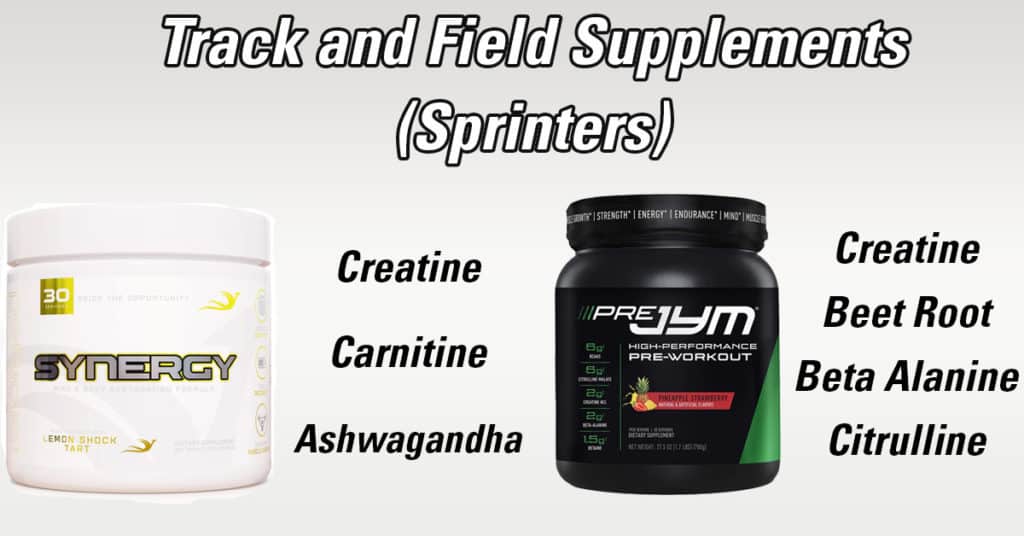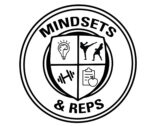
As every high level track meet tells us, the margin for error in sprinting events is small. Any ethical advantage a sprinter can gain is necessary to compete with the best athletes, whether at the high school, college, or Olympic level.
The separation of first and second place doesn’t happen on race day, it occurs in the training leading up to the competition. A sprinter that can consistently train hard and improve their performance will ultimately have an advantage when they line up to race.
While dietary supplements are mainly used by fitness enthusiasts who frequent the gym, they actually translate much better to athletics. The benefits of supplementation can help track athletes in a variety of ways.
The supplement ingredients listed will aid sprinters in one or more of the following manners; by improving anaerobic running capacity, enhancing recovery, or shortening reaction time.
It’s important to define exactly what anaerobic running capacity is. Anaerobic running capacity consists of high intensity sprints that are no longer than a few minutes long. Therefore, the supplement recommendations are relevant for participants in the 100 meters, 200 meters, 400 meters, 110 meter hurdles, 400 meter hurdles and all relays involving those events.
Recovery is an overlooked aspect of sprint training. How can you expect to perform in each training session if you are not recovered from the previous one? While sleep and nutrition are the main aspects of recovery, supplementation can aid as well. In fact, supplementation can sometimes provide nutrients that cannot be consumed in adequate doses from food alone.
Reaction time is particularly critical in short events like the 100 meters, or even the 55 meters if you participate in indoor track and field events. Believe it or not, certain supplements can improve reaction time from the starting blocks.
Nitrates
Nitrates are naturally found in foods such as beets and green leafy vegetables like spinach. But as mentioned, sometimes you have to consume a large amount to get an effective dose. Supplements have the ability to extract nutrients from these natural sources and supply them at the proper amount.
Nitrates were shown to improve performance in a popular testing mechanism known as the Yo Yo Intermittent Recovery Test. This test basically consists of repeated bouts of cardiovascular exercise with rest in between, not unlike a typical track practice.
Dietary nitrate supplements are popular in pre workout formulas, usually noted on the supplement facts panel as NO3. In addition, you could also supplement with a beetroot powder or beetroot juice. These are more viable options for consuming nitrates in adequate amounts than eating a vat full of salad with beets.
L-Carnitine
L-Carnitine is one of the most versatile supplement ingredients. Carnitine is a transporter that helps to utilize fat for energy; so many people take it in hopes of improving fat loss. But it has so many more benefits than that, especially as it relates to athletic performance.
Carnitine has the ability to reduce lactate and ammonia production. Lactate and ammonia are the byproducts of intense exercise. They are the reasons you feel fatigued and have to slow down during an intense training session. If you’ve ever felt a burning sensation in your quadriceps muscles or calves when sprinting, it is likely due to an accumulation of lactate and ammonia.
By supplementing with carnitine, you can delay this onset of fatigue and train harder for longer.
Carnitine was shown to increase anaerobic work capacity in a Wingate test. A Wingate test is another popular testing mechanism for anaerobic performance. While it is not a sprint in of itself, it matches sprints in duration and intensity. The test was 5, 10 second sprints with 1 minute of rest in between.
Wingates are a brutal exercise, and carnitine supplementation was able to improve performance. This study was performed in trained subjects as well. This is important to note because many studies are performed in beginners, and sometimes the results don’t translate to people who regularly exercise.

Caffeine
Caffeine is so widely consumed on a daily basis by millions of people that sometimes we forget it acts as a performance enhancer. This applies to both mental and physical performance. Caffeine is a stimulant that enhances focus and increases overall energy.
Caffeine has been shown to improve reaction time, anaerobic running capacity, power output, and training volume (how much total work is done over the course of a training session).
Sometimes it’s as simple as needing something to wake up. For college athletes in particular, practice may be early in the morning. After a late night of classes, homework, and studying, you may need something just to get going.
In terms of dosage, caffeine tolerance varies greatly from person to person. If you are someone that cannot handle caffeine, do not feel the need to supplement with it just to experience a performance benefit. There is no sense in feeling jittery and uncomfortable in the name of athletics.
Those who don’t have an issue with caffeine can start slow and use trial and error to find an appropriate dose. Most people start at about 150mg and assess their tolerance from there. Caffeine tolerance increases with consistent use, so it’s important to take a break for a few weeks to continue experiencing benefit.
Ashwagandha
Ashwagandha is slowly finding its way into comprehensive supplements like pre workout formulas due to its wide array of benefits. There are few things that ashwagandha doesn’t do.
Ashwagandha is an ancient herb used for years as a natural means to reduce stress and anxiety. Decreasing stress is never a bad thing for athletes, especially those who compete at the highest level. But its benefits go beyond increasing wellbeing.
Ashwagandha has been shown to increase power output and sprint velocity in young healthy males. It also increased VO2 max, which is an indicator of cardiovascular performance. VO2 max is a measure of an athlete’s ability to use oxygen during intense exercise.
Creatine
For those versed in the supplement game, creatine is considered old reliable. It is the most effective supplement in terms of increasing power output.
Creatine is a high energy phosphate molecule, which is a fancy way of saying it can fuel intense exercise. When you are in the midst of a 100 or 200 meter sprint, you are absolutely using creatine to power through that race.
When you supplement with creatine, it is stored inside the muscle cell to be used when needed. During exercise it gets depleted, which is why it is important to take creatine every day to keep muscle stores full.
Muscles are 70% water. In addition to providing energy, creatine also pulls water into the muscle cell. This not only increases the overall volume (size) of the muscle cell, but aids in hydration as well. This is often confused with subcutaneous (under the skin) water retention. But creatine doesn’t really do that, so there shouldn’t be any significant bloating as a result of creatine supplementation.
Creatine monohydrate has been shown to fully saturate muscles with creatine, therefore there is no need to use any other form. Creatine monohydrate is a rare combination of being cheap and effective, with a 3 month supply costing only about $20.
The standard daily dose is 3-5 grams. This dosing protocol will allow muscles to become fully saturated in a few weeks. After that you can continue with the same dose for maintenance.
Some people choose to implement a creatine loading protocol, which is 20 grams per day for 5 days followed by the maintenance dose thereafter. This will saturate muscles more quickly; however it sometimes leads to gastrointestinal distress. I typically don’t recommend this, especially to athletes who are expected to perform on a daily basis. You don’t want anything disrupting your training.
Summary and Product Recommendations
While all of the above supplement recommendations are completely natural, it is important to check with your sport organization’s governing body to make sure they don’t violate any rules. They may even provide a list of supplement brands that they recommend (i.e. WADA compliant brands). Supplements are unregulated to a certain degree, so it’s always helpful to check the handbook to see if they recommend certain companies.
The supplement ingredients can be taken in conjunction with one another. Sometimes combining two ingredients even offers a synergistic effect. The product recommendations contain multiple ingredients from the list in efficacious doses.

Synergy Post Workout Formula
It’s hard to ask for a better supplement given the ingredients listed in this article. Synergy’s post workout supplement contains adequate doses of creatine, carnitine, and ashwagandha. It’s considered a post workout formula but can truthfully be taken at any time.
The only thing lacking is caffeine, which may honestly be a good thing. Firstly, for anyone that doesn’t tolerate caffeine, they can take this without any issue. Second, anyone that wants caffeine can simply add it themselves. It’s not particularly hard to do, and also gives the user the freedom to add exactly however much they want.
You could even vary caffeine from day to day. Sometimes you may need an extra kick, while other days you may need less or none at all.
Pre Jym
Pre Jym has both creatine and beet root extract to supply nitrates. It contains caffeine as well as other quality ingredients that didn’t make the cut like citrulline and beta alanine.
Citrulline and beta alanine are more conducive to muscular endurance, but have potential for improving sprint performance as well. Citrulline improves blood flow while beta alanine buffers acid, which can delay fatigue similar to the way carnitine does.
